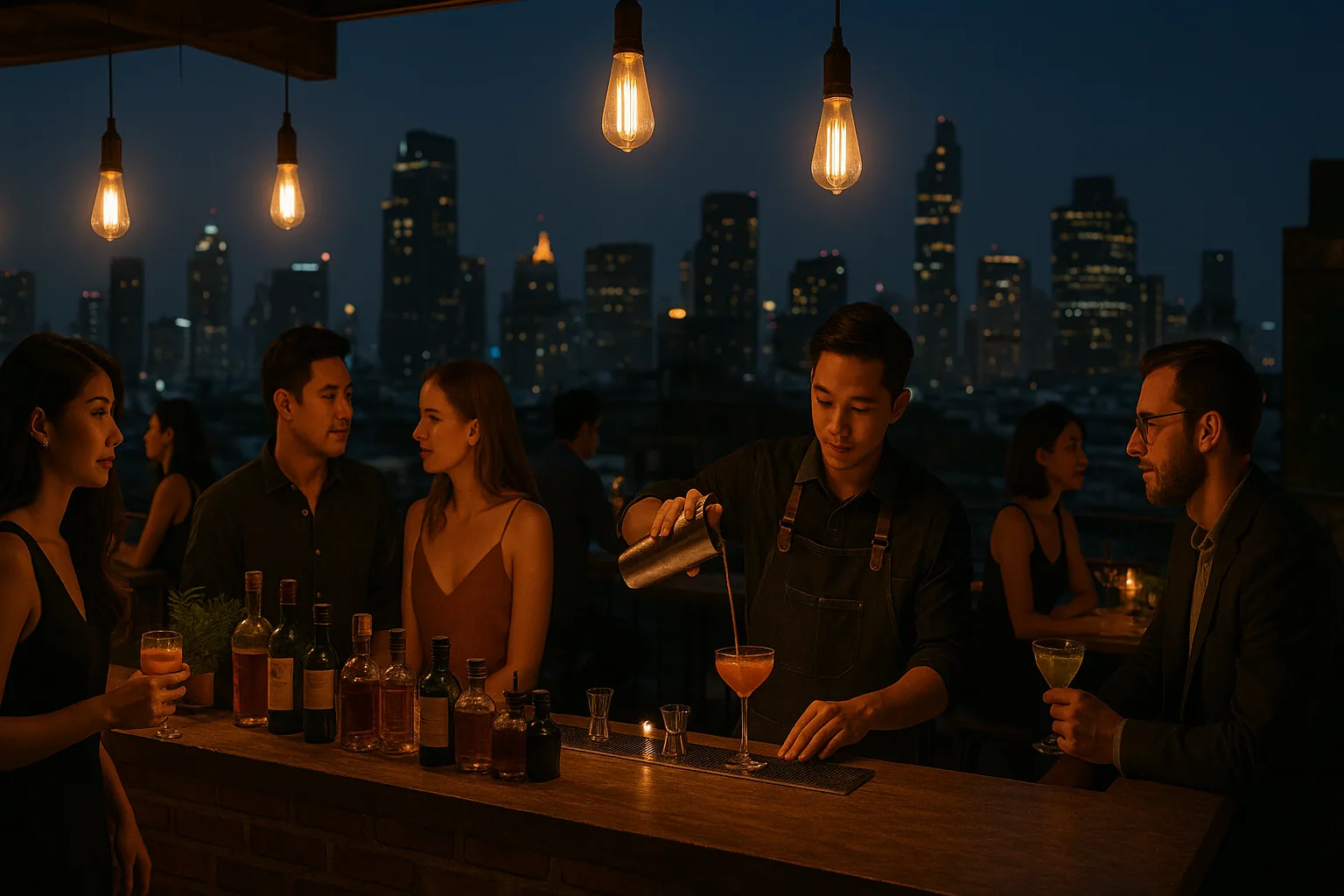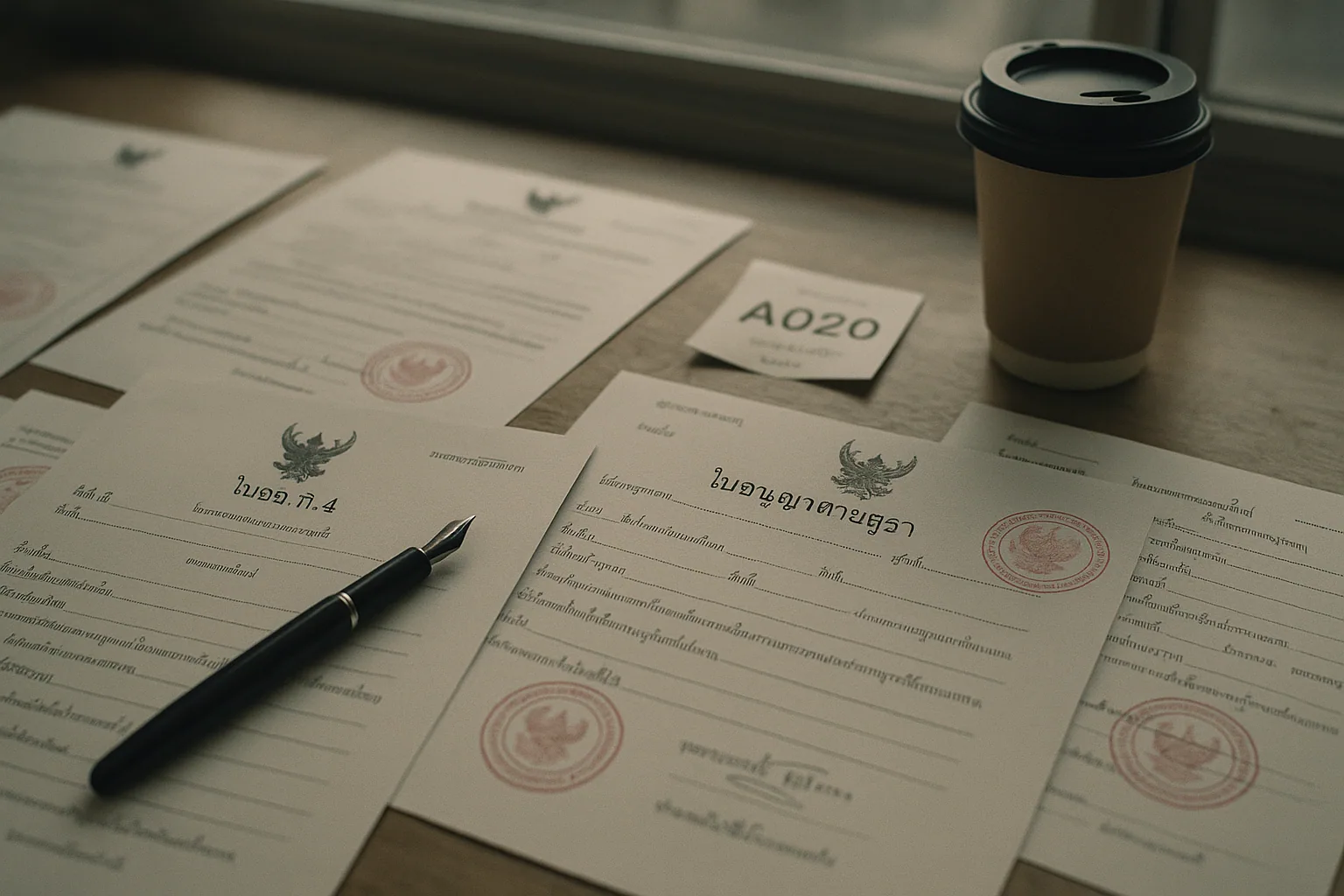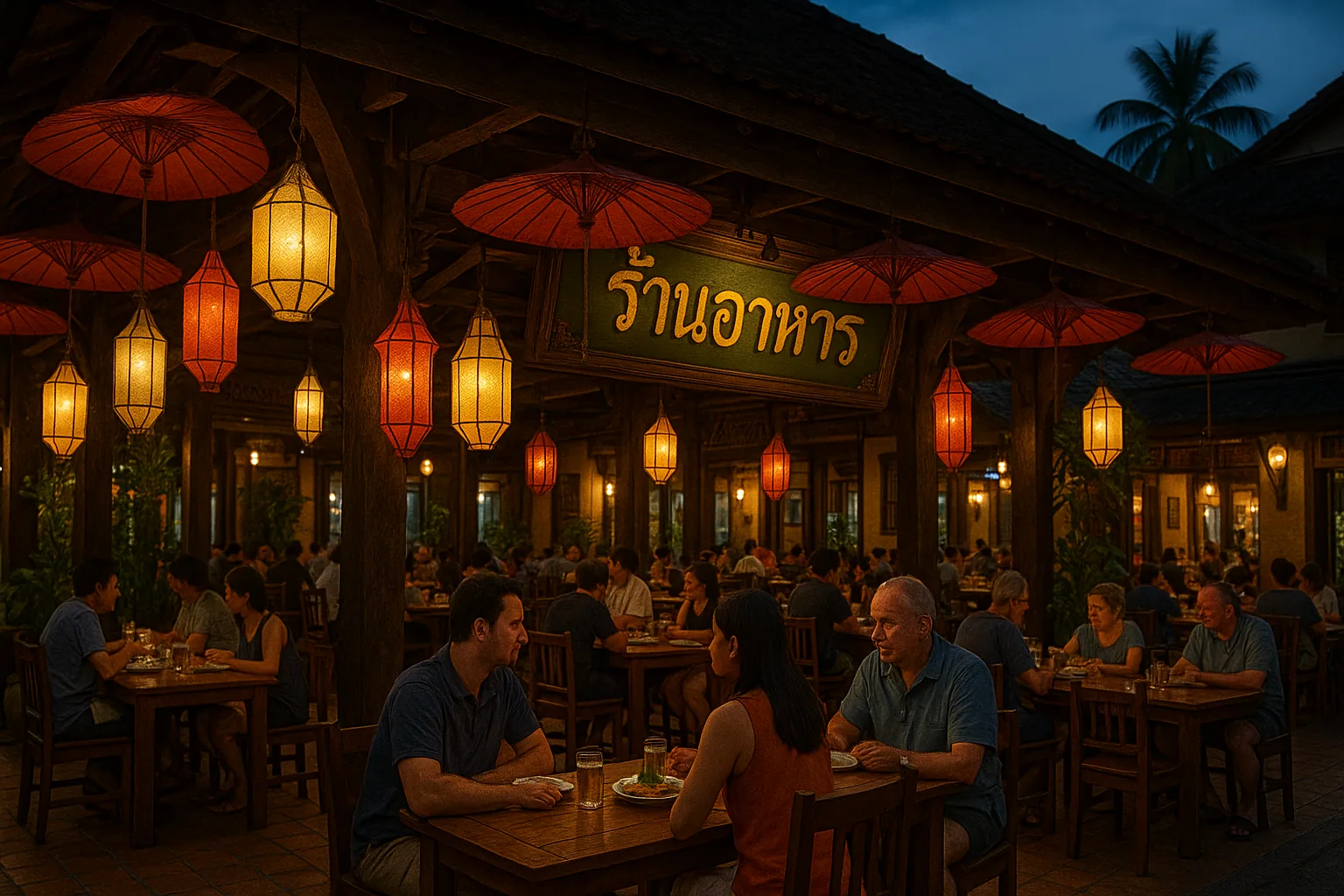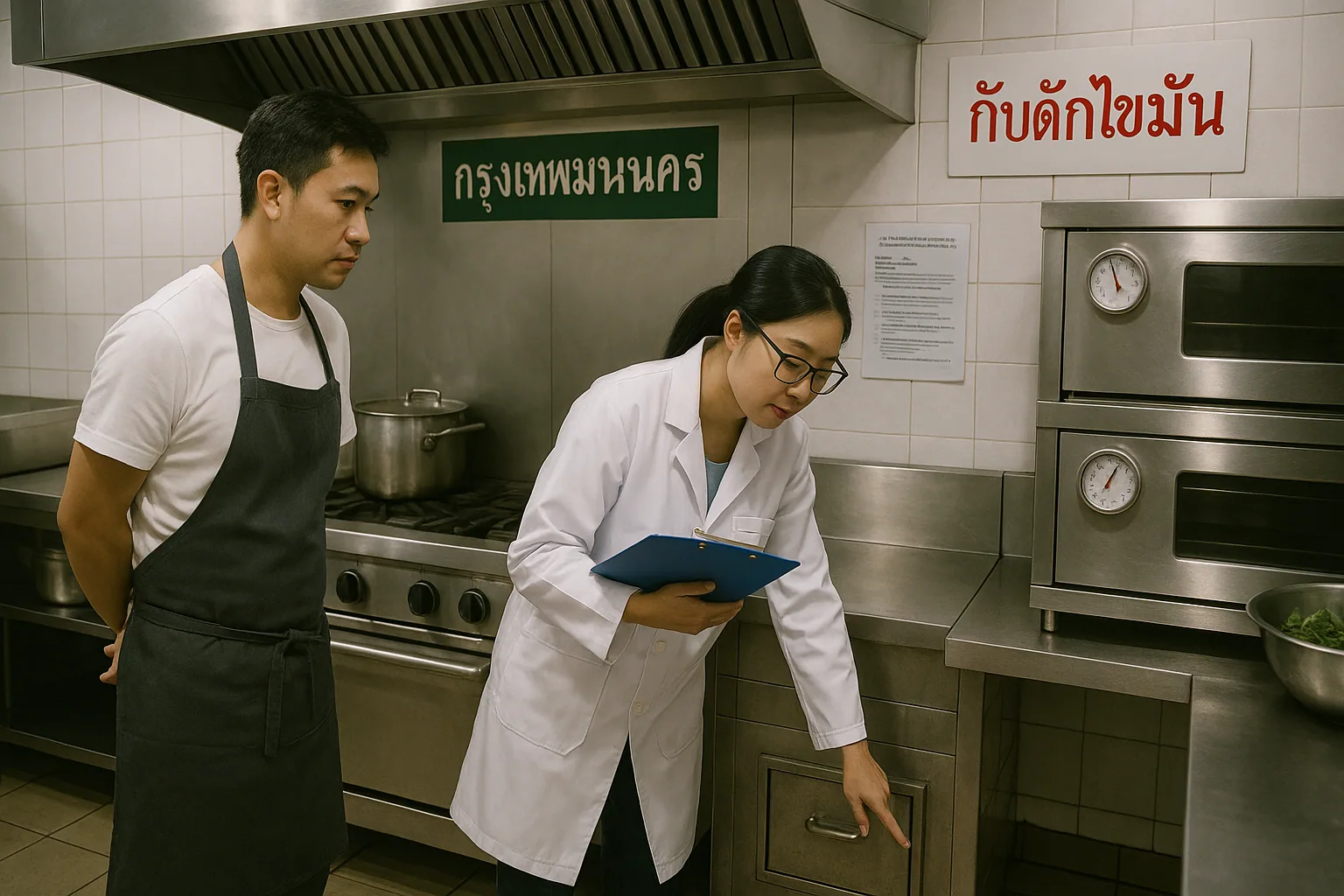
🍽️Opening Restaurants & Bars
The reality of building an F&B business in Thailand

The reality of building an F&B business in Thailand
The rooftop bar in Bangkok's Thonglor district was everything its foreign owner had envisioned--exposed brick, craft cocktails, sunset views. What he hadn't planned on was sitting outside the excise office for the fourth time, waiting for a liquor license application that would ultimately be rejected because the venue sat within the 300-meter exclusion zone around a nearby bilingual school. Six months of buildout, 4 million baht invested, and he couldn't legally serve the drinks that were supposed to pay his rent.
Thailand's food-and-beverage industry is still booming. The country welcomed more than 35 million international visitors in 2024, on track toward the pre-pandemic peak of nearly 40 million. Layer in a growing Thai middle class and long-stay expat community, and the opportunities look obvious. Walk through any Bangkok neighborhood and you'll see new restaurants, cafes, and bars opening monthly. The market feels wide open, the cost of entry seems manageable, and the dream of running your own beachside bar or hip Bangkok bistro is genuinely achievable.
But the dream and the reality exist in different universes. Opening a restaurant or bar in Thailand isn't difficult because the market is saturated or the competition is fierce--though both are true. It's difficult because you're navigating a regulatory system designed primarily for Thai nationals, with foreign ownership restrictions that fundamentally shape how you structure your business, licensing processes that can take months or fail entirely, and health and safety standards that are strict in ways you won't anticipate until an inspector rejects your kitchen layout for reasons that make no sense to Western sensibilities.
"The dream and the reality exist in different universes. You're navigating a regulatory system designed primarily for Thai nationals, with restrictions and processes that can derail even the best-planned ventures."
Restaurants and bars fall under List 3 of Thailand's Foreign Business Act (FBA). Any company that is legally "foreign"--meaning foreign shareholding is 50% or more--must secure a Foreign Business License to sell food or beverages. Those licenses are rarely granted for ordinary service venues, which is why most successful foreign-run restaurants operate through genuine Thai-majority companies (<=49% foreign shareholding) so they are not treated as "foreign" under the FBA.
That pushes aspiring operators toward real Thai partnerships: a spouse, long-term friend, or investor who holds majority shares and actually helps run the business. These partnerships work when the relationship is strong, the shareholder agreement is detailed, and everyone acknowledges the legal responsibilities attached to ownership.
The shortcut--"nominee" shareholders who hold shares in name only while the foreigner really controls everything--is illegal and risky. Authorities periodically run nominee crackdowns, and penalties include fines, prison, and forced closure. More practically, a nominee shareholder can legally exercise their rights at any time, leaving the foreign investor with no recourse because they intentionally violated the law.
What about 100% foreign ownership? It's theoretically possible if you obtain Board of Investment (BOI) promotion or a Foreign Business License, but BOI incentives currently focus on manufacturing and "future foods" (e.g., novel/organic food production), not restaurant service. Unless you're operating a production facility or food-tech project, BOI won't apply, and FBL approvals for service venues are extremely rare.
Bottom line: if you want to run an F&B venue, either form a genuine Thai-majority company with partners you trust or prepare for a long-shot FBL application. There is no safe middle ground involving paper nominees.
Today a Thai private limited company needs **two** promoters/shareholders (the law changed in February 2023). To stay outside the FBA you keep foreign ownership at 49% or less and let genuine Thai partners hold the rest--nominee arrangements remain illegal. Start with a clean shareholder agreement and clear governance so everyone knows how decisions are made.
Company registration through the Department of Business Development usually takes 1-3 weeks once documents are ready, with government fees roughly 5,000-15,000 THB (professional/legal fees extra). If you want the company to sponsor a foreign work permit and long-stay visa, plan on paid-up capital of about 2 million THB per foreigner (often 1 million THB if the foreigner is married to a Thai). Get the structure right before you touch a lease or start any license applications.

Regulatory snapshot: November 14, 2025. Always confirm requirements with your local district and excise offices before applying.
Once you've sorted ownership structure, you enter the licensing process. This is where many ventures stall--not because the requirements are impossible but because they're split across agencies that don't coordinate. Understand the landscape before you sign a lease or pour concrete.
Start with the **License for a place selling or storing food** under the Public Health Act. Apply at your local municipality (in Bangkok, your BMA district office). Expect to submit floor plans, photos, company documents, and proof of compliant ventilation, grease management, and staff facilities. Officials inspect your kitchen before approval. Processing typically takes 2-4 weeks after inspection, and you renew annually.
Serving alcohol requires a separate license from the **Excise Department**. Most venues use a Type 2 retail license (on-premise consumption). Fees commonly fall around 2,000-5,500 THB per year, while importer/wholesaler Type 1 licenses sit near 8,250 THB. Lead time ranges from a few weeks to several months, and you're paying rent while you wait.
Location due diligence is critical. The national 300-meter ban surrounds educational institutions and their dormitories; measurement is from your entrance to the school's property line. Selling alcohol inside temple grounds is prohibited, but there isn't a nationwide 300-meter ban for temples--local orders may add their own restrictions. Get written confirmation from district and excise officers before you sign a lease.
Alcohol sale hours remain 11:00-14:00 and 17:00-24:00 nationwide, with bans on major Buddhist holidays and election days. The government has debated relaxing afternoon bans throughout 2025 and recently added consumer fines for drinking during prohibited periods, so verify local enforcement right before launch.
If you host live music, DJs, or stay open past midnight, you also need an **Entertainment Place** license (police/BMA in Bangkok, district/province elsewhere). Processing takes 2-6 months and scrutiny is intense. On top of that you'll register and pay **signboard tax (phasi pai)** to the municipality for exterior signage--rates depend on size and whether the text is Thai-only or mixed language.
The liquor license timeline alone has sunk businesses. Applications can take one to six months; during that time you're paying rent, staff, and utilities without alcohol revenue. Some operators soft-open serving food only, others negotiate rent deferrals, but you should budget to float at least six months of fixed costs with zero bar income.
- Food premises license (Public Health Act): Apply at the district/municipality; inspection-driven; typical turnaround 2-4 weeks with annual renewal.
- Liquor license (Excise Type 2): Required for on-premise alcohol sales; expect fees around 2,000-5,500 THB per year (importer/wholesale Type 1 ~ 8,250 THB). Lead time: weeks to months.
- Entertainment Place license: Needed if you host live music/performers or close after midnight. Authority varies (police/BMA in Bangkok). Processing 2-6 months.
- Signboard tax (phasi pai): Annual municipal tax on exterior signage; rate depends on area and whether text is Thai-only or mixed language. File when you install/update signs and every first quarter.
- Food-handler medical certificates: Annual health checks (X-ray/blood/stool) for every kitchen staffer; keep originals on-site for inspections.
In real estate, they say location is everything. In Thai F&B, location determines whether your business concept is even legal. Before you fall in love with a space, before you negotiate lease terms, before you invest a single baht in deposits or buildout, you need to verify three things: zoning compliance for restaurant/bar use, distance requirements for alcohol sales, and whether previous tenants operated successfully with the licenses you'll need.
The zoning verification isn't something your landlord can definitively answer. They'll say "yes, of course restaurants are allowed here" because they want to rent the space. But what you need is written confirmation from the local district office that your specific premises, at this specific address, can legally operate as a restaurant and (if applicable) serve alcohol. This verification process takes a morning--go to the district office with the property address, request a formal check of distance requirements and zoning compliance. They'll tell you definitively whether liquor licenses are possible at that location.
Some landlords resist this verification because they know the answer will be no. Prospective tenants have discovered after signing leases that their chosen location sits inside the 300-meter exclusion zone of a secondary school, or that the building is zoned for retail but not food service, or that the previous tenant never actually obtained the licenses you now need. Once you've signed a lease and paid deposits, you're committed. If licenses prove impossible to obtain, you lose your investment entirely.
Beyond legal compliance, location determines almost everything about your business's viability. Bangkok neighborhoods have distinct characters and customer bases. Thonglor attracts upscale Thais and expats willing to pay premium prices. Ari draws younger, hipper crowds interested in Instagram-worthy experiences. Sukhumvit caters to tourists and expats seeking familiarity. Opening an authentic Italian restaurant in a neighborhood where no one speaks English and Thai food dominates might work, but only if you're targeting the adventurous 5% of local Thais interested in Western cuisine, not the larger expat market.
Competition matters less than you'd think--Bangkok can support multiple good Italian restaurants in the same neighborhood if they each offer something distinct. What matters more is alignment between your concept and your location's natural customer base. For detailed neighborhood guides and what type of businesses thrive where, see our comprehensive Bangkok guide.


Thai health inspectors don't care about your Michelin-star training or your previous restaurant in Melbourne. They care about whether your kitchen meets Thai standards, which are specific, enforced, and often different from what you're used to. The inspection happens before your restaurant license is issued, and again periodically (scheduled and surprise visits) after you're operating.
The kitchen requirements focus on separation and sanitation. You must have physically separate preparation areas for raw and cooked food. Refrigeration must be adequate with visible temperature monitoring. Ventilation systems must meet commercial standards--a residential hood won't pass inspection. Waste management requires proper grease traps and separation systems. Staff facilities must include adequate toilets and hand-washing stations positioned correctly relative to food prep areas. Floors, walls, and surfaces must be appropriate materials (stainless steel and tile, not wood in most areas).
Every person handling food must have a valid health certificate, renewed annually. This requires a hospital visit for chest X-rays (tuberculosis screening), blood tests for infectious diseases, and stool samples. The certificate costs 300-1,000 THB per person and takes 3-7 days to process. When inspectors visit, they'll verify that every kitchen employee has current certification. Missing certificates, even for one employee hired last week, can trigger violations.
Fire safety requirements are equally specific: commercial-grade fire extinguishers in kitchen and dining areas (inspected annually), emergency exit signage and lighting, clear evacuation routes, first aid kits, and fire blankets in cooking areas. Larger establishments need smoke detectors and sprinkler systems. These aren't suggestions--they're conditions of license approval and renewal.
What frustrates many foreign operators is that the standards themselves aren't published in clear, English-language guidelines. You learn them during inspection, when officials point out violations you didn't know were violations. This is where hiring a consultant who specializes in F&B licensing pays for itself immediately. They know what inspectors look for, can review your kitchen plans before buildout, and identify problems before you've invested in equipment that won't pass muster.
If you plan to work in your own venue, plan for two compliance hurdles: roughly four Thai employees for every foreign work permit **and** about 2 million THB in paid-up capital per foreigner (often 1 million THB if the foreigner is married to a Thai). Immigration and the Department of Employment both check those thresholds during visa/work-permit renewals.
These aren't nominal positions--they must be real employees registered with Social Security, earning at least the provincial minimum wage (as of 1 July 2025 that's roughly 337-400 THB per day, with Bangkok at 400 THB) and receiving statutory benefits like paid leave, severance, and 5% employer Social Security contributions. Underpaying or failing to register staff is a fast track to losing your work permit.
Many foreign restaurant owners discover they're grateful for this requirement--you genuinely need Thai staff who speak the language, understand local suppliers, and can navigate daily operations in ways that would take you years to learn. The 4:1 ratio shapes your staffing from day one and must be maintained continuously. Learn more about Thai business culture and working relationships.
When people ask what it costs to open a restaurant in Thailand, they're usually thinking about the obvious expenses: rent deposits, kitchen equipment, furniture, initial inventory. Those are significant--figure 2-5 million THB minimum for a small operation, 5-15 million for mid-scale, and 15-50 million or more for upscale concepts. But the costs that kill businesses aren't usually the upfront capital. They're the carrying costs during the licensing period and the working capital required to survive your first year.
Let's say you find a location in July, sign a lease, and begin buildout. Your restaurant license application goes in by September. Inspection happens in October, approval comes in November. Your liquor license application goes in alongside the restaurant license. But liquor licenses take longer. December passes. January passes. You're now paying rent for seven months, with no revenue. Even if you soft-open serving food only, you're likely operating at a loss because the economics of most restaurants depend on alcohol margins.
Smart operators budget for 6-12 months of operating capital before opening, specifically to cover this licensing limbo. They also build relationships with landlords who will defer or discount rent during the pre-opening period. Some negotiate lease terms that don't begin until all licenses are secured. But newer foreign entrepreneurs often underestimate this gap, budgeting for 2-3 months of pre-opening costs and then scrambling when month six arrives with still no approvals.
Ongoing costs include license renewals (annual for most permits), health certificate renewals for all staff (annual), fire safety inspections, and corporate tax filing. These recurring expenses total 10,000-100,000 THB annually depending on your scale, separate from rent, utilities, payroll, and cost of goods. Budget for them from day one, because they're non-negotiable.
After reading about ownership restrictions, licensing complexity, health standards, and costs, you might wonder if any foreign-owned restaurants succeed in Thailand. They do. Bangkok and beach destinations are full of thriving foreign-owned F&B businesses. But the successful ones share certain patterns.
They researched exhaustively before committing. They visited multiple locations, verified zoning and distance requirements in writing, spoke to neighboring business owners about license approval timelines, and hired consultants to review their plans before signing leases. They treated the research phase as an investment worth months of time and tens of thousands of baht in consulting fees, because they understood that mistakes during setup are expensive or impossible to fix later.
They solved ownership structure properly from the start. Those with Thai spouses created genuine partnership agreements with clear roles and responsibilities. Some found other Thai business partners they genuinely trusted through years of relationship-building. Very few successful operators used nominee arrangements--the ones who did live with constant legal vulnerability, and several have been forced to restructure or sell when relationships with nominees soured.
They budgeted conservatively for both time and money. Successful operators assume everything will take twice as long and cost 50% more than initial estimates. They maintain 12+ months of working capital. They plan soft openings that don't require full licenses, testing operations and building customer base while waiting for approvals. They don't quit their day jobs or burn bridges before their restaurant is profitable--they treat the first year as an extended experiment that might still fail despite their best efforts.
Most importantly, they build relationships. With district officials who process licenses. With neighboring business owners who can advise on local dynamics. With suppliers who extend favorable credit terms during startup. With customers who become regulars and advocates. Thailand's business culture runs on relationships more than contracts, and the foreigners who succeed understand that investing in people matters as much as investing in equipment or marketing.
Opening a restaurant or bar in Thailand is genuinely achievable for foreign entrepreneurs willing to navigate its complexity methodically. But it's not the romantic adventure of spontaneously opening a beachside bar because you loved Thailand on vacation. It's a serious business undertaking requiring significant capital, detailed planning, cultural adaptation, and realistic timelines. For those who approach it with eyes open to both the opportunities and the obstacles, Thailand's F&B industry offers room to build something lasting. For those who underestimate the complexity, it's an expensive way to learn that dreams and regulations exist in very different worlds.
Max foreign share w/out FBL
49%
Paid-up Capital / Foreigner
~2M THB*
*~1M THB if married to a Thai
Thai to Foreign Staff Ratio
4:1
Daily Wage (Bangkok, Jul 2025)
400 THB